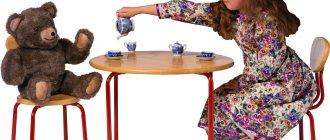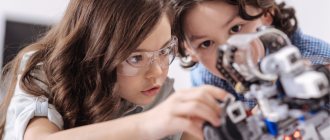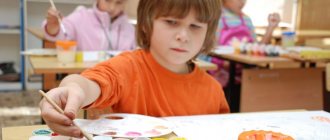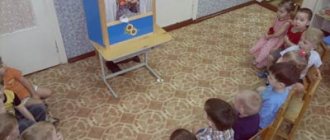Good afternoon, dear readers! Today’s article will make you feel nostalgic, remembering your kindergarten.
What memories does preschool bring back?
Perhaps the husband remembered how he was forced to finish an unloved dish and was put in a corner. And your memories will be tender and warm. And they are all connected with the teacher. Many mothers carefully choose a preschool institution, guided by reviews and stories from friends.
After all, they understand what the role of the teacher is in the development of the child.
A teacher is a person whom parents trust to organize the development of a preschooler while they are at work. The atmosphere in the group, health, socialization and development of the toddler as a person depend on it.
How many terrible stories on the Internet are related to bullying of children in kindergartens or stories about how employees of the institution deliberately create an environment in which children get sick.
But there are also good teachers whom little boys want to marry, love and run to them as if on a holiday, to kindergarten. Partially, the choice of a mentor depends on the luck and intuition of the mother.
MAGAZINE Preschooler.RF
V.G. Belinsky wrote: “Education is a great thing: it decides a person’s fate.” The responsibility that falls on the shoulders of the teacher is not just looking after children and organizing educational games; This is the first step that determines a person's destiny. When a child first attends a preschool, the role of the teacher plays a decisive role. An affectionate, gentle attitude, softness in voice, mystery is one of the possible and repeatedly proven options in a relationship with a child. The teacher, with his entire appearance, must endear the child to himself and positively emotionally set him up for communication. Communication between children can sometimes be unpredictable; intuition and endurance are needed here. The teacher’s speech intonations are of considerable importance. A calm, demanding tone is all you can afford. A teacher who cares only about order and discipline is not a teacher, but a monster. In the hands of the teacher, responsibility is not only for the physical, but also for the moral and psychological state of the child. One of the main tasks of the teacher is to be able to focus children’s attention on the game, interest them and make each child feel that he is an important and necessary member of the team. The teacher must have respect for the child and a highly developed sense of justice. Only with an honest attitude, with the ability to keep his word (the baby always remembers if something was promised to him), periodically letting the children feel, will the teacher achieve maximum success and become an example for the pupils. From the first days, it depends on the teacher what kind of psychological program for the child’s behavior will be laid down. Therefore, game situations should change taking into account the daily routine and time frame. Changing games will create a feeling of a kaleidoscope of unforgettable impressions in the child and will make him want to return to the magical land of kindergarten. The teacher must have a multifaceted talent: instantly fantasize and compose fairy tales based on current situations in order to attract the attention of children. In some moments, you need to rely on your own intuition, which consists of many factors that ensure normalization of the situation in inadequate situations. It is necessary to carefully analyze the individual development of each child. Visibility is the main and decisive factor in the upbringing of preschool children. A child who falls into the hands of a teacher who competently builds his relationship with children, after the first “battles” before visiting kindergarten, soon becomes joyful and cheerful and eagerly goes to kindergarten, where an atmosphere of understanding and goodwill reigns. There are no bad and good children, but there are different temperaments, the characteristics of which the teacher must take into account when choosing methods and means used in kindergarten. If, when working with children, the types of their temperaments are taken into account, then the teacher will practically not have any special problems with the students. Children are always drawn to people who understand what they want without being too strict with them. When children play pranks, they themselves internally expect some kind of reprimand; if it is not forthcoming, then the children try to repeat their prank again. If there was no punishment this time, then we can say with confidence that the children “sat on your head.” In other words, the teacher must be not only gentle and not only strict, but such that the children respect him and at the same time are not afraid of him. A teacher should be such that children see him as an older comrade in games, a caring “mother” in everyday matters, and a loved one who can be trusted with something intimate - every teacher should strive for such an ideal. Unfortunately, educators often make mistakes in raising preschool children: partly due to their inexperience, and partly (although this, of course, should not be allowed) due to an unwillingness to delve into the essence of education. The first mistake is the most serious - the lack of an individual approach to children. Every teacher always needs to remember that each child is unique, individual, that he has a lot of characteristics that distinguish him from other children, many interests that need to be developed. The educator must take full responsibility for the fact that he has in his hands all the possibilities for shaping the child’s character, his worldview, and habits. It is the educator who must pay attention to what activities the child is inclined to and inform the parents about this. If you take a closer look at each child, it will soon become clear that for one it is enough to explain that he is right, for another to set a friend as an example, for the third, try to explain everything on an emotional level (to influence the child’s feelings, and not the teacher’s shouts). In order to correct this mistake, you need to change your views on children in order to identify the differences between a particular child and other children in the group. The second mistake is paying attention to some children at the expense of inattention to other children. Here we are talking mainly about the so-called “favorites”. It should be remembered that children are extremely sensitive - and they usually have a heightened sense of justice. A good teacher should unite children, help them so that each of them finds a friend. The teacher must be equally strict and kind with all children! The next mistake is unfair punishment. The essence of this mistake is that the teacher does not want to understand the children’s actions. At this moment, he is driven by the desire to quickly settle the incident by imposing punishment. Before assigning a punishment (putting him in a chair), you should thoroughly understand the conflict that has arisen and try to judge the parties fairly and, first of all, reconcile the children among themselves. Another type of unfair punishment is the humiliation of a child. Many educators, oddly enough, consider it quite pedagogical to put the guilty child in front of all the other children. Tell them about the offense that he committed, thereby causing laughter and bullying from other children. In this case we are talking about humiliating the dignity of a little person. As a result of such punishment, the child is teased by other children, or even stop communicating with him. The situation can often be resolved only by transferring the other child to another kindergarten. Raising your voice at the child. You can't achieve much by shouting. The child, having become accustomed to having his voice raised at him, subsequently becomes practically insensitive to comments made to him in such a tone. Severity and raising your voice are two different things! It is strictly forbidden to use physical force!!! For each child, you can choose your own key, which will open the way for him to realize his good and bad deeds. If the teacher takes into account all the individual characteristics of each child, then he will learn to find an approach to each child. If you are a teacher in your field, then you will be able to avoid these mistakes and find an approach to each child, his parents and colleagues.| Next > |
What should a teacher be like?
Many mothers know that the main thing in kindergarten is an adequate teacher. Because the child’s desire to participate in social education depends on this person. And there are two criteria that cause discussions among parents: age and work experience of the teacher.
Young teachers are not yet tired of routine, complex work, they are ready to use creative approaches to develop the little one’s creative abilities and thinking. But they have one drawback - the lack of life and professional experience.
They may not be able to distinguish a capricious toddler from a sick one, undeservedly punishing him. Sometimes children are overly pampered.
An elderly teacher, due to his age, will not be able to properly look after the children.
Simple actions like catching someone from a hill or catching up require certain physical activities that older people will not be able to do. In addition, they have no desire to follow new trends in the development of the child.
For example, an attempt to retrain a left-handed child by tying his left hand with a bandage. Funny? And in some kindergartens in the USSR such methods were practiced.
The ideal option is a teacher between 30 and 45 years old. In this range, women have their own children, thanks to which they have acquired practical experience that differs from the recommendations of the ministries.
Teacher competencies
The goal of a teacher’s pedagogical work is to educate a free, comprehensively developed, mentally and physically healthy, creative personality. After completing his stay in a children's educational institution, a child must be fully prepared to study at school, that is, have the necessary set of knowledge and skills, the ability to communicate freely, the ability to take care of himself at the proper level, good health and a developed, stable psyche. To carry out such responsible work, a kindergarten teacher needs the following competencies:
- Communication skills. The teacher will have to constantly communicate, not only with children, but also with their parents, other adults, colleagues and management.
- Correct oral and written language. Children absorb information like a sponge, which is why it is so important that they hear literate speech, on the basis of which their own speaking and sentence-forming skills will be formed.
- The ability to tell interesting stories and present information in an easy and attractive manner. Children, especially from younger groups, are unable to perceive complex verbal structures and fix attention on one object and moment. The teacher is required to be able to competently and measuredly present information so that it can be fully assimilated without overloading the child.
- Emotional intellect. The teacher will need the ability to generously share his emotions with children.
- Self confidence. Children are clever manipulators. They will not forgive weakness of character; such a person will not have authority in the group.
- Friendliness.
- Positive attitude.
- The ability to empathize, empathy. This is one of the most important human qualities of a teacher.
- Attractive and well-groomed appearance. This requirement applies to both the health and appearance of the teacher, since children copy everything, and aesthetic education also includes appearance.
- Patience. Working with one child is difficult, but working with many different characters is very difficult. It will take a lot of love and incredible patience.
- Resistance to stress. This is a very important quality, since the work of a teacher is full of stress.
- Organization is an important condition for a teacher’s work in a group, when it is necessary to provide training, education and guarantee the health of a dozen or more pupils.
- Ability to motivate. Without this, it will not be possible to engage children in any activities.
- Creativity. Modern requirements force educators to abandon the authoritarian teaching method, paying more and more attention to progressive innovative methods. And they require from the teacher not only extensive knowledge and practical skills, but also the ability to take a creative, inventive approach to their work.
- Curiosity. In the teaching profession, you cannot stop at any one method or technology; you need to constantly learn new things and implement them in your professional activities.
To determine quality and success, as well as identify possible errors and shortcomings, an analysis of the teacher’s pedagogical work is used. Based on its results, one can judge how well the teacher copes with his professional responsibilities. Also, such an analysis serves as the basis for awarding a particular qualification based on the results of certification.
The participation of educators in the work of pedagogical councils is also of great importance. They hold creative reports, exchange of experience, discussion of inspections carried out, and so on. All this has a positive effect on the future activities of the teacher in the preschool educational institution.
Various publications, printed and electronic publications, specialized websites and forums also help to successfully understand the complexities of work, especially for young professionals. Ready-made coursework on the pedagogical activities of a teacher can also be used as supporting material. These are not samples for copying, but a way to systematize and assimilate information important for your own future activities.








